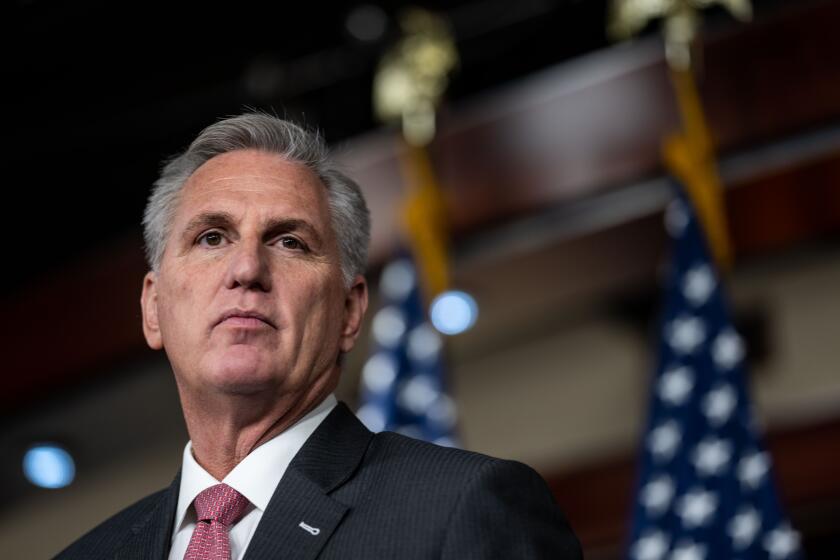Democrats shouldn’t distance themselves from Biden in the midterms

- Share via
In January 2010, President Obama began his second year as president with a 50% job approval rating, including 84% of Democrats.
Believe it or not, this was considered bad news and leading up to the midterms, congressional Dems — particularly those running for re-election in red states — spent a significant amount of time trying to distance themselves from him.
As you may recall, that tactic failed miserably. Apparently, Republican voters wanted Republican politicians, not Democrats masquerading as independents in a foolhardy attempt to attract Republican voters. That didn’t stop Democrats from doing the same thing in 2012, 2014 and 2016 despite Obama averaging 83% job approval among Democrats during his time in the White House. The most embarrassing moment from this insane strategy came in 2014 when Alison Lundergan Grimes, the former Secretary of State for Kentucky, refused to say whether or not she voted for Obama during a debate with Sen. Mitch McConnell.
Lundergan Grimes was a delegate in 2008 and 2012 at the Democratic convention and she actually had the nerve to characterize her dodging the question as a privacy issue. McConnell beat her by 15 points.
Look, it’s no secret that Democrats are concerned about a massive red wave in November. And with Biden’s approval rating at around 43%, I’m sure some Democratic incumbents are considering distancing themselves from the administration in hopes of saving their own hide.
My unsolicited advice: Don’t do it. You’ll only embarrass yourself like Lundergan Grimes, or former Sen. Mark Begich of Alaska, who promised to “be a thorn in” Obama’s backside; or former Sen. Mary Landrieu of Louisiana, who rated Obama “a six to seven”out of 10 during a televised debate. If you’re going to lose, at least go down fighting for the principles you believe in as opposed to criticizing a president whose agenda everyone knows you supported.
According to a study conducted by Roll Call, “every vulnerable Senate Democrat up for reelection in 2014 voted with Barack Obama at least 90% of the time in 2013.” Begich and Landrieu each supported Obama 97% of the time and they had the nerve to run reelection campaigns as White House frenemies.
Not surprisingly, they fooled no one, certainly not Republican voters. But they did succeed in looking like politicians who will say anything to get elected. Who doesn’t love voting for those kind of people?
Look, the truth is, if Democrats lose the House in the midterms, that would not be unusual. Between 1914 and 2018 the president’s party gained House seats in the midterm only three times — George W. Bush in 2002, Bill Clinton in 1998 and Franklin Roosevelt in 1934. In fact, only Bush and Roosevelt won seats in both the House and Senate after a midterm, likely reflecting the nation’s mood after 9/11 and FDR’s efforts to address the Great Depression.
Calmes: Thanks to gerrymandering, Republicans can continue to behave abominably and win the midterms
Republicans redraw existing districts to make them safer for Republicans and group Democratic-leaning voters into as few districts as possible.
Two remarkable moments in time. Other midterm elections saw losses for the president’s party. Obama lost twice as many House seats in 2010 as Bush did in 2006. Trump lost more than twice as many House seats in 2018 as Obama did in 2014.
Trump did manage to win two Senate seats while losing House seats, something only two other presidents in the past 100 years have been able to do in a midterm. But he is also the only president to be impeached twice, so there’s that.
The point being, despite the red chest beating/blue sky is falling rhetoric we’re likely to hear from political pundits in the coming months, history shows this congressional pendulum has swung back and forth for well over a century.
What shouldn’t swing back and forth is the commitment to the policies Biden, and by proxy the Democratic Party, laid out during the 2020 campaign. The policies that attracted a record 81 million votes. The policies supported by nearly 60% of voters under 30 who did not vote in the previous two elections.
Speaking of the young, Politico conducted an analysis of the 2020 election and of top 10 issues for voters, those in the 18-34 age group were the ones most concerned with climate change. What would it say to those voters if they see incumbent Democrats distancing themselves from Biden, who has made climate change a top priority? This won’t be a winning strategy. That’s not to say lawmakers should rubber stamp everything that comes out of the White House. Conflict and debate in a party are an essential aspect to a healthy democracy.
But ducking your party’s principles and your record in an election year is cowardly behavior. And nobody wants to send a coward to Washington.
More to Read
A cure for the common opinion
Get thought-provoking perspectives with our weekly newsletter.
You may occasionally receive promotional content from the Los Angeles Times.












